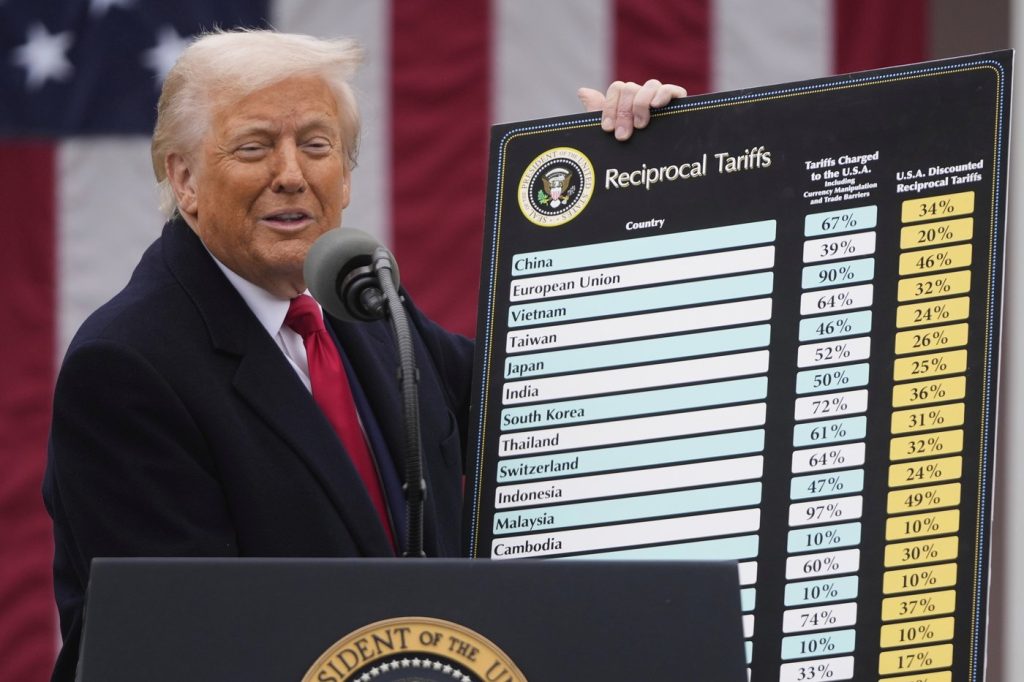WASHINGTON U.S. President Donald Trump is encountering legal challenges for the first time regarding his tariffs, but he has various alternative strategies to employ in his aim to reshape global trade policies.
A federal appeals court is currently deliberating whether to place a stay on Trump's universal tariffs, which were enacted under the International Emergency Economic Powers Act of 1977, commonly referred to as IEEPA. Last month, the U.S. Court of International Trade ruled that these tariffs were unlawful.
The IEEPA is a national security statute that grants the U.S. president the authority to regulate economic transactions upon declaring a national emergency. Remarkably, it has never been used for tariff purposes prior to this situation.
Trump has declared emergencies at both the northern and southern U.S. borders, citing issues related to the flow of fentanyl and migrant activity, to impose economy-wide tariffs on Canada and Mexico. Subsequently, he announced an emergency regarding trade deficits to apply his retaliatory tariffs, dubbed "Liberation Day" duties, on a wide array of nations.
The trade court ruled that Trump overstepped presidential authorities by using the IEEPA to implement tariffs so broadly. In response, the Trump administration quickly filed an appeal, with the White House indicating it plans to take the case to the Supreme Court.
Following the adverse ruling, White House Economic Council Director Kevin Hassett expressed confidence that the court would ultimately side with Trump. He stated that should the court rule against them, "we’ll have other alternatives that we can pursue to ensure American trade fairness.”
While the U.S. Constitution initially assigns the power to levy taxes and tariffs to Congress, over the past century, various laws have been enacted that allow the president limited control under specific circumstances. Trump is now exploring the application of these laws, some of which have never been utilized before.
One potential avenue for Trump is Section 338 of the Tariff Act of 1930, which allows for tariffs of up to 50 percent against countries that treat U.S. products unfavorably compared to those from other nations. Greta Peisch, a former general counsel for the Office of the U.S. Trade Representative, noted that Section 338 has never been employed by any president before, and it may be challenging for the administration to substantiate a case for its use.
Another legal option for Trump is Section 301 of the Trade Act of 1974. This section permits the president to take trade actions if an investigation reveals that a trading partner's policies are unreasonable or discriminatory. Trump previously implemented tariffs on certain imports from China and the European Union through this law during his initial term.
However, Section 301 necessitates country-by-country investigations into trade policies before imposing tariffs. These investigations can take weeks or months and require a period for public comment, which could significantly decelerate Trump's ability to impose widespread tariffs swiftly.
If an expedited approach is desired, Peisch suggests that Trump might resort to Section 122 of the Trade Act of 1974. This lesser-used law allows the president to impose tariffs of up to 15 percent to address large and significant U.S. balance-of-payments deficits. However, such tariffs can only remain in place for a maximum of 150 days without Congressional approval, which limits Trump's leverage to pressure countries into trade agreements, as they might simply wait out the tariffs.
Moreover, Trump has previously indicated that tariffs could help alleviate the national deficit, but the temporary nature of Section 122's powers could hamper its efficacy as a long-term revenue strategy.
Overall, Peisch highlighted that none of the alternative statutes would easily facilitate Trump's ambition of erecting a universal tariff barrier around the United States. "Nothing is a great fit without a lot of work," she stated, indicating the complexity and challenges that lie ahead for the administration in this endeavor.











